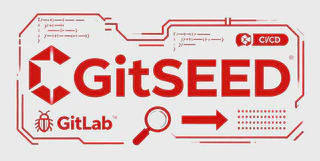Automated Assessment Tools for Programming Education
 Image credit: Perplexity AI
Image credit: Perplexity AIDelivering personalised, scalable feedback to students in large programming courses remains one of the most persistent challenges in Computer Science and Software Engineering education.
Traditional Automated Assessment Tools (AATs) often struggle with integration flexibility, language dependence, and limited feedback modalities, typically supporting only one language and relying solely on test-suite-based evaluation through dedicated web interfaces.
🌱 Introducing GitSEED
GitSEED is a Git-backed, language-agnostic automated assessment platform designed for Programming Education and Software Engineering (SE) Education.
Students interact with GitSEED entirely through GitLab, enabling a natural workflow that mirrors professional software development practices. Using GitSEED, Computer Science and SE students master essential version control concepts while receiving automated, personalised feedback on their programming assignments and projects.
Meanwhile, faculty members can easily customise GitSEED’s evaluation pipeline by integrating a variety of program analysis and verification tools, such as Valgrind for memory leak detection; CFaults for MaxSAT-based fault localisation; and MENTOR for semantic program repair.
This modularity allows educators to provide feedback that is aligned with course goals and adaptable across programming paradigms and languages.
⚙️ Workflow

The figure above illustrates the GitSEED workflow.
- Student submission: Students interact with GitSEED via GitLab by committing their code to a project repository.
- Automated trigger: GitLab’s runners automatically notify GitSEED upon each new submission.
- Evaluation: GitSEED evaluates the submission against predefined test suites and the configured analysis tools.
- Feedback delivery: A detailed feedback report is automatically pushed back to the student’s Git repository, providing immediate and actionable insights.
In addition, GitSEED maintains dashboards and leaderboards for each evaluation element, which are posted in the central course repository.
These dashboards allow students to track their progress, monitor test success rates, compare performance with peers, and visualise their improvement over time.
Thanks to the integration with modern development environments (e.g., VS Code, which natively supports git), students can submit assignments and receive feedback directly within their workspace, minimising context switching. For those preferring web-based workflows, GitLab’s interface remains fully supported.
🧪 Deployment and Impact
Since 2023, GitSEED has been deployed in three courses (across seven course executions) at Instituto Superior Técnico (IST).
Experimental evaluations examined GitSEED’s impact on student engagement and learning outcomes, revealing positive correlations between GitSEED usage and improved performance in diverse Computer Science courses.
GitSEED’s flexibility makes it suitable for a wide range of educational settings, from introductory programming to advanced logic-based problem solving.
🚀 Recent Use Cases of GitSEED
C Programming Courses:
GitSEED detected memory leaks and logic bugs, helping students identify low-level errors and strengthen debugging skills.Logic Programming (Prolog):
GitSEED was configured to provide automated bug localisation and style suggestions, supporting good programming practices and enhancing students’ understanding of declarative problem solving.Master’s Course in Computational Logic:
GitSEED supported the assessment of projects focused on NP-hard optimisation problems, where students implemented solutions using SAT/SMT solvers in Python.
The pipeline was extended with custom analysis tools to evaluate satisfiability and optimality, offering richer feedback beyond correctness.
A distinctive pedagogical feature of GitSEED is its feedback philosophy: rather than offering direct fixes, GitSEED highlights problematic regions in the student’s code, encouraging reflection, exploration, and independent problem-solving.
GitSEED represents a step towards scalable, transparent, and customisable AI-driven assessment systems, empowering educators to blend formal analysis tools with human-centred teaching, and students to learn through feedback that is immediate, interpretable, and authentic to real-world software engineering practice.
Reference
- (2025). MENTOR: Automated Feedback for Introductory Programming Exercises. PhD Thesis.
Ricardo Brancas, Vasco Manquinho and Ruben Martins (2025). Combining Logic and Large Language Models for Assisted Debugging and Repair of ASP Programs In ICST 2025.
Ricardo Brancas, Pedro Orvalho, Carolina Carreira, Vasco Manquinho, Ruben Martins (2025). Can Automated Feedback Turn Students into Happy Prologians?. In arXiv 2025.
I am always excited to explore new ideas together! Feel free to reach out 📧 if you are interested in collaborating on this research topic!